开心学英语五年级上册unit1~unit5练习
- 格式:doc
- 大小:35.00 KB
- 文档页数:2

【英语试题】2021五年级英语上册第一次检测试卷(开心学英语)章五年级英语第一卷第一卷试卷classnameno.mark听力部分(40分)一、听朗读,把你听到的单词的字母代号填在题前括号内。
(10分)()1. a、 funb。
法姆克。
妈妈()3.a.meatb.needc.eat()4. a、纸。
斯台普克。
贴纸()5.a.boysb.toysc.noise()6. a、有线电视。
batc。
聚酯食品包装材料()7.a.familyb.farmc.farmer()8. a、 juiceb。
foodc。
胶()9.a.sauceb.coinsc.noise()10. a、出租车司机。
消防员。
公务员二、听朗读,用阿拉伯数字标出你听到的单词的顺序。
(10分)工厂胶带月盐()money()dictionary()cake()rabbit()煮沸()日历()剪刀()邮票三、听问句选答语。
(10分)()1. a、她想去巴黎。
b、谢萨努斯。
c、他是个骗子。
()2.a.theyareplayingbasketball.b.theyaregoingtothebeach.c、 tomandjennyaregoingtothebank。
()3.a.yes,heis.b.yes,it’stony’s.c.it’slily’s.()4. a、我吃了些豆腐。
b、 sheneedssomefruit。
c、他们需要一些糖。
()5.a.no,ineed.b.yes,hedoes.c.yes,iam.四、听录音,大声朗读句子,并标记“√“以相应的形式(10分)name果汁rice肉tofu蔬菜jenny彼得lisa托尼笔试部分(60分)一、写出可以替换划线部分的单词。
(9分)1、lisawantstobeadoctor.2、这太夸张了。
3、tonyhassomepaper.二、按要求写单词。
(6分)1.farm(职业名词)2.aunt(对应词)3.Meet 4字典(复数)5.some(否定式)6.sun(同音词)三、在划线部分选择不同发音的单词。
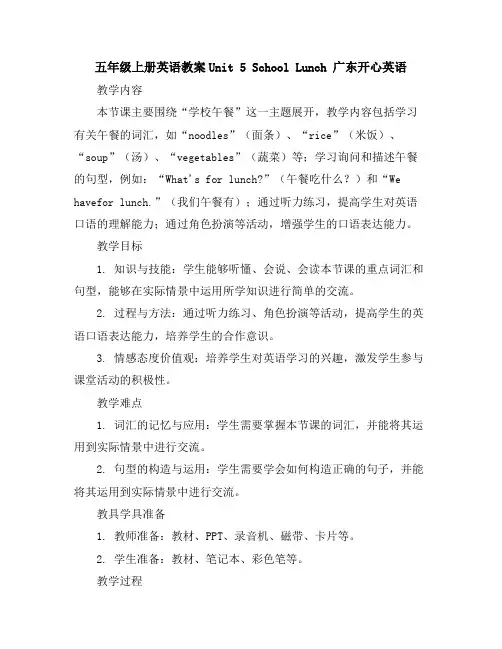
五年级上册英语教案Unit 5 School Lunch 广东开心英语教学内容本节课主要围绕“学校午餐”这一主题展开,教学内容包括学习有关午餐的词汇,如“noodles”(面条)、“rice”(米饭)、“soup”(汤)、“vegetables”(蔬菜)等;学习询问和描述午餐的句型,例如:“What's for lunch?”(午餐吃什么?)和“We havefor lunch.”(我们午餐有);通过听力练习,提高学生对英语口语的理解能力;通过角色扮演等活动,增强学生的口语表达能力。
教学目标1. 知识与技能:学生能够听懂、会说、会读本节课的重点词汇和句型,能够在实际情景中运用所学知识进行简单的交流。
2. 过程与方法:通过听力练习、角色扮演等活动,提高学生的英语口语表达能力,培养学生的合作意识。
3. 情感态度价值观:培养学生对英语学习的兴趣,激发学生参与课堂活动的积极性。
教学难点1. 词汇的记忆与应用:学生需要掌握本节课的词汇,并能将其运用到实际情景中进行交流。
2. 句型的构造与运用:学生需要学会如何构造正确的句子,并能将其运用到实际情景中进行交流。
教具学具准备1. 教师准备:教材、PPT、录音机、磁带、卡片等。
2. 学生准备:教材、笔记本、彩色笔等。
教学过程1. 导入:教师通过展示午餐的图片,引导学生谈论午餐,激发学生的学习兴趣。
2. 新课内容呈现:教师通过PPT展示本节课的重点词汇和句型,引导学生学习。
3. 听力练习:教师播放录音,学生听后回答问题,提高学生的听力理解能力。
4. 角色扮演:学生分组进行角色扮演,模拟午餐场景,运用所学知识进行交流。
板书设计1. Unit 5 School Lunch2. 重点词汇:noodles, rice, soup, vegetables等。
3. 重点句型:What's for lunch? We havefor lunch.作业设计1. 听力练习:听录音,回答问题。
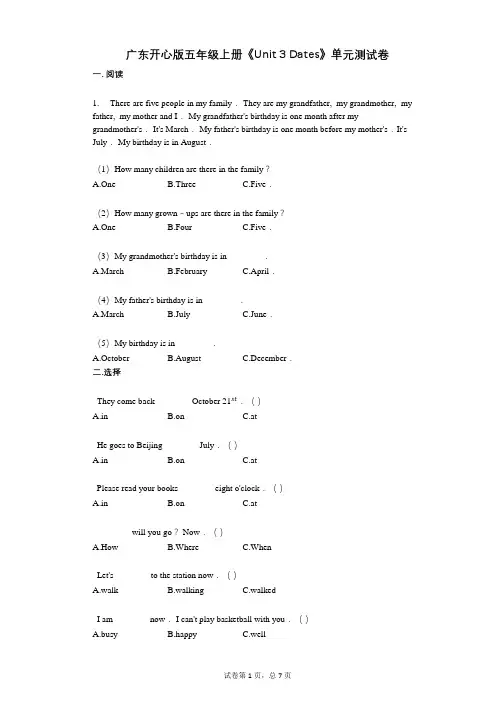
广东开心版五年级上册《Unit 3 Dates》单元测试卷一. 阅读1. There are five people in my family. They are my grandfather, my grandmother, my father, my mother and I. My grandfather's birthday is one month after my grandmother's. It's March. My father's birthday is one month before my mother's.It's July. My birthday is in August.(1)How many children are there in the family?________A.OneB.ThreeC.Five.(2)How many grown﹣ups are there in the family?________A.OneB.FourC.Five.(3)My grandmother's birthday is in________.A.MarchB.FebruaryC.April.(4)My father's birthday is in________.A.MarchB.JulyC.June.(5)My birthday is in________.A.OctoberB.AugustC.December.二.选择They come back ________October 21st.()A.inB.onC.atHe goes to Beijing ________July.()A.inB.onC.atPlease read your books ________eight o'clock.()A.inB.onC.at________will you go? Now.()A.HowB.WhereC.WhenLet's ________to the station now.()A.walkB.walkingC.walkedI am ________now. I can't play basketball with you.()A.busyB.happyC.wellDo you like listening ________the music?()A.inB.toC.atDo you have ________salt? No, I don't have________.()A.some…someB.any…anyC.any…someWhat's the weather like in________ spring?()A.aB.theC./三.填写完整单词并写出中文意思Jan________. 2.Feb________. 3.Mar________. 4.Apr________. 5.Aug________.(6).Sept________. 7.0ct________. 8.Nov________. 9.Dec________.四. 填写完整单词________ct________b________r(5).N________v________mb________r(6).D________c________mb________r五.选词填空It's a________ (birthday, birthday's) party. Let's go and have some________(food,foot).________ (When, What) is your birthday, Tony? It's October________(11tℎ,11st).My________(birthday, birthday is)today!What's the________(day, date)today?Our National Day (国庆)is on________(January, October)1st.参考答案与试题解析广东开心版五年级上册《Unit 3 Dates》单元测试卷一. 阅读1.【答案】ABBBB【考点】文中细节【解析】我家有五口人,他们是我的祖父、我的祖母、我的父亲、我的母亲和我的我.我的祖父的生日比我祖母的生日晚一个月.是三月.我的父亲的生日比我母亲的生日早一个月.是七月.我的生日是八月.【解答】(1)A.考查细节理解.由关键句:"There are five people in my family.They are my grandfather, my grandmother, my father, my mother and I."可知,我家有五口人,他们是祖父、我祖母、父亲、母亲和我.只有一个孩子.故选A.(2)B.考查细节理解.由关键句:"There are five people in my family.They are my grandfather, my grandmother, my father, my mother and I."可知,我家有五口人,他们是祖父、我祖母、父亲、母亲和我的我.即四个成年人.故选B.(3)B.考查细节理解.由关键句:"My grandfather's birthday is one month after my grandmother's. It's March."可知,祖父的生日在三月,比祖母的晚一个月,那么祖母的生日是在二月,即February.故选B.(4)B.考查细节理解.由关键句:"My father's birthday is one month before my mother's.It's July."可知,爸爸的生日在七月.故选B.(5)B.考查细节理解.由关键句:" My birthday is in August."可知我的生日在八月.故选B.二.选择【答案】B【考点】介词【解析】他们在十月二十一日回来.【解答】本题考查介词的用法.in在…里,用在某一年里,某一月里;on在某一天;at在某一时刻.本题中在十月二十一日为on.故选:B.【答案】A【考点】介词【解析】他七月份去北京.【解答】本题考查介词的用法.在某一月用in,在某一天用on;在某一时间点用at.本题中 in July在七月.故选:A.【答案】C【考点】介词【解析】早上八点你要读书.【解答】考查时间介词,句子表示"早上八点你要读书.",A.in在…里面,不符合题意,B.on在…上面,不符合题意,C.at在,具体几点前,构成搭配,符合题意,D.1不对,不符合题意.故选:C.【答案】C【考点】疑问词组【解析】你什么时候去啊?现在.【解答】本题考查的是疑问词的辨析.how如何;where在哪里;when在什么时候;根据句意:你什么时候去啊?现在.由now可知提问的是时间.故选:C.【答案】A【考点】动词原形【解析】我们现在步行去车站.【解答】考查动词原形.句子时态是一般现在时,let是使役动词,后跟动词的原形,即walk.B是现在分词.C是过去式,D错误.故选:A.【答案】A【考点】形容词【解析】我现在很忙,我不能和你一起打篮球.【解答】考查形容词词义辨析.句子时态为一般现在时,题干译为:我现在____,我不能和你一起打篮球.busy忙碌的,happy高兴的,well好的,I我.可知busy在此处最符合语境.故选:A.【答案】B【考点】动词短语【解析】你喜欢听音乐吗?【解答】考查短语搭配.题干是一般现在时,是由do引导的一般疑问句.听音乐是固定搭配listen to music.ACD均无此类用法.故选:B.【答案】B【考点】形容词【解析】你有一些盐吗?不,我没有.【解答】考查形容词词义辨析.题干是一般现在时.some用于肯定句,也用于疑问句表示表示邀请和请求并希望得到肯定回答,any用于否定句和疑问句表示任何一个.题干是do 引导一般疑问句,用于询问,答语也是否定句.故选:B.【答案】C【考点】冠词的用法【解析】在春天的天气怎么样?【解答】本题考查短词的用法.根据题干所示,通常情况下,在英语中季节前不加定冠词the.故选:C.三.填写完整单词并写出中文意思【答案】一月,二月,三月,四月,八月,九月,十月,十一月,十二月【考点】单词、词组【解析】(1)一月.(2)二月.(3)三月(4)四月.(5)八月.(6)九月.(7)十月.(8)十一月(9)十二月.【解答】考查单词翻译.(1)Jan.是一月January的缩写形式.故填:一月.(2)Feb.是二月February的缩写形式.故填:二月.(3)Mar.是三月March的缩写形式.故填:三月.(4)Apr.是四月April的缩写形式.故填:四月.(5)Aug.是八月August的缩写形式.故填:八月.(6)Sept.是九月September的缩写形式.故填:九月.(7)Oct.是十月October的缩写形式.故填:十月.(8)Nov.是十一月November的缩写形式.故填:十一月.(9)Dec.是十二月December的缩写形式.故填:十二月.四. 填写完整单词【答案】O,o,e,o,e,e,e,e,e【考点】单词、词组【解析】(1)July七月,(2)August八月,(3)September九月,(4)October十月,(5)November十一月,(6)December十二月.【解答】考查单词拼写.小写字母e,r,m,o,n,s,u,v占中格;大写字母J,A,S,O,N,D和小写字母t,l,b,占中上格;小写字母y,g,p占中下格.五.选词填空【答案】birthday,food【考点】选词填空【解析】这是一个生日派对.我们一起吃些食物吧.【解答】考查选词填空.(1)生日聚会是birthday party.没有birthday 's的用法.故选:birthday.(2)food译为食物,在此处符合语境.foot译为脚,不符合语境.故选:food.【答案】When,11tℎ【考点】选词填空【解析】汤尼,你什么时候过生日?十月十一日.【解答】考查选词填空.句子时态是一般现在时,根据答语是日期可知问句是问的时间,即when引导的特殊疑问句,故选when.what译为:什么.不符合句意.十一号即 the eleventh,是以th结尾的,即11tℎ.故选:When.11tℎ.【答案】birthday is【考点】选词填空【解析】我的生日是今天.【解答】考查选词填空.题干是一般现在时,主语是my brithday,我的生日.是第三人称单数,所跟be动词为is.译为是.整句译为:我的生日是今天.故选:birthday is.【答案】date【考点】选词填空【解析】今天是几号?【解答】考查选词填空.句子时态是一般现在时,date日期,询问日期通常说:What's the date today?故填:date.【答案】October【考点】选词填空【解析】我们的国庆节在十月.【解答】考查选词填空.句子时态是一般现在时,国庆节是在十月,即October.故填: October.。
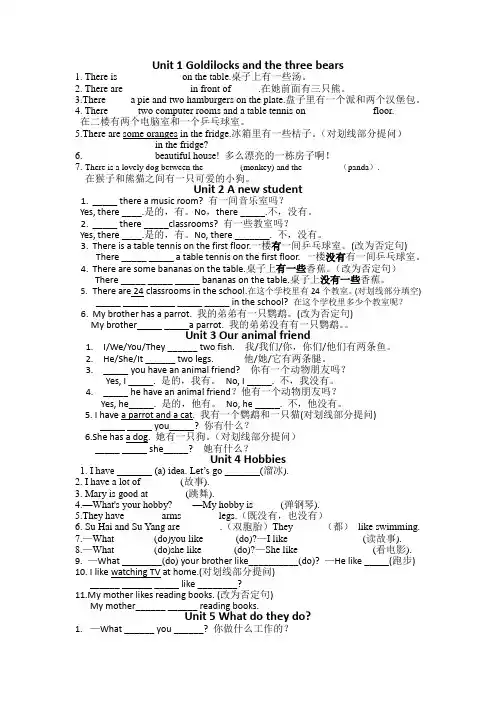
Unit 1 Goldilocks and the three bears1. There is______ ______ on the table.桌子上有一些汤。
2. There are ______ ______ in front of _____.在她前面有三只熊。
3.There ____ a pie and two hamburgers on the plate.盘子里有一个派和两个汉堡包。
4. There _____ two computer rooms and a table tennis on ______ ______ floor.在二楼有两个电脑室和一个乒乓球室。
5.There are some oranges in the fridge.冰箱里有一些桔子。
(对划线部分提问)_______ _______ in the fridge?6. _______ ______ beautiful house! 多么漂亮的一栋房子啊!7. There is a lovely dog between the ______ (monkey) and the ________(panda).在猴子和熊猫之间有一只可爱的小狗。
Unit 2 A new student1._____ there a music room? 有一间音乐室吗?Yes, there ____.是的,有。
No,there _____.不,没有。
2._____ there _____classrooms? 有一些教室吗?Yes, there ____.是的,有。
No, there _______. 不,没有。
3.There is a table tennis on the first floor.一楼有一间乒乓球室。
(改为否定句)There _____ _____ a table tennis on the first floor. 一楼没有有一间乒乓球室。
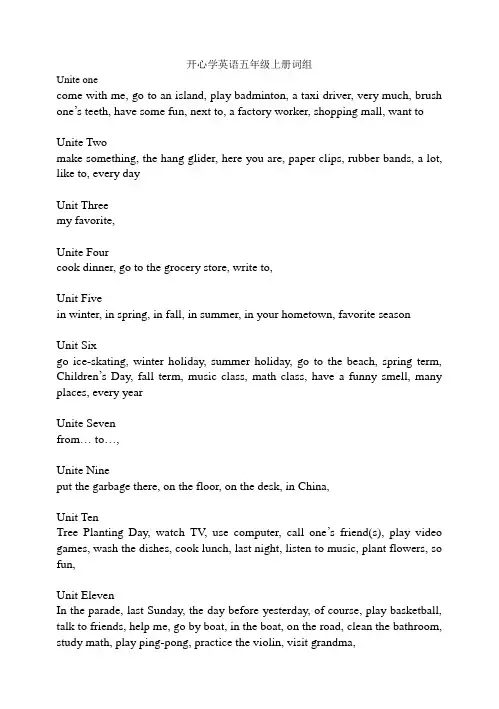
开心学英语五年级上册词组Unite onecome with me, go to an island, play badminton, a taxi driver, very much, brush one’s teeth, have some fun, next to, a factory worker, shopping mall, want to Unite Twomake something, the hang glider, here you are, paper clips, rubber bands, a lot, like to, every dayUnit Threemy favorite,Unite Fourcook dinner, go to the grocery store, write to,Unit Fivein winter, in spring, in fall, in summer, in your hometown, favorite seasonUnit Sixgo ice-skating, winter holiday, summer holiday, go to the beach, spring term, Children’s Day, fall term, music class, math class, have a funny smell, many places, every yearUnite Sevenfrom… to…,Unite Nineput the garbage there, on the floor, on the desk, in China,Unit TenTree Planting Day, watch TV, use computer, call one’s friend(s), play video games, wash the dishes, cook lunch, last night, listen to music, plant flowers, so fun,Unit ElevenIn the parade, last Sunday, the day before yesterday, of course, play basketball, talk to friends, help me, go by boat, in the boat, on the road, clean the bathroom, study math, play ping-pong, practice the violin, visit grandma,Unit Twelvein the tree, at school, after school, practice the piano, play football, after dinner, talk about, go to school, after lunch, in the morning, in the afternoon, in the evening, clean the windows, fold the clothes, water the plants, dust the furniture, water the vegetables, wash clothes, in our group, at home, last week, a lot of改一个字母变另一个单词sun- son, sun-fun, month-mouth, cut- but, but-bat, cat-bat, carrot-parrot, pet-net, call-tall, hot-hat, toy-boy, bag-big, dig-dog, stop-shop, cook-look, cake-make, box-fox, meat-meet, fan-fun, mug-hug, fall-call-tall, too-two-toe-zoo, so- no, funny-sunny, cold-fold, cone-bone, coat-boat-goat cow-row- how-now, smell-small, ear-eat, mouse-house, in-on, mouth-south, wood-food, year-near-hear, yell-tell, toad-road, name-game, five-fine, like-lime, glue-blue, act-ant-art, light-night-eight, nine-fine动词变化形式are—werebuy—buying—buys—boughtcall—call s—call ing—call edcarry—carr ies—carry ing—carr iedclean—clean s—clean ing—clean edcome—come s—com ing—c a mecook—cooking—cooks—cookedcount—count s—count ing—count edcut—cut s—cut ting—cutdo—do es—do ing—d ideat—eat s—eat ing—atefinish—finish es—finish ing—finish edfix—fixes— fixing—fixedgo—go es—go ing—wenthave—ha s—hav ing—ha dhelp—help s—help ing—help edis—wasjump—jump s—jump ing—jump edlisten—listen s—listeni ng—listen edmake—making— made —makespaint—paint s—paint ing—paint edplant—plant s—plant ing—plant edpractice—practice s—practic ing—practice dput—put s—put ting—putread—reads—reading—readrun—run s—run ning—r a nshake—shakes—shaking—shookStudy—stud ies—study ing—stud iedtalk—talk s—talk ing—talk eduse—use s—us ing—use dvisit—visit s—visit ing—visit edwash—wash es—wash ing—wash edwatch—watch es—watch ing—watch edwrite—write s—writ ing—wr o tespring:March .April. May.summer:June. July.Augustfall: September. October.Novemberwinter: December .January February1.winter holiday寒假(January and February)2.summer holiday 暑假(July and August)3.spring term春季学期(March April May June)4.fall term 秋季学期(September October November December)5.There are four season s in a year.(一年有四个季节)6. There are twelve month s in a year.7. There are thirty days in September.8.There are thirty-one days in August.9.There are twenty-eight days in February.10.It’s green in spring.11. It’s hot in summer.12. It’s cool and windy in fall.13. It’s cold in winter.14. It’s yellow and orange in fall.反义词1. slow fast2. big small3.good bad4. sit stand5. hot cold6.warm cool7.first last8.clean dirty9.heavy light 10.black white 11.long short 11.happy sad 12.go come 13.up down 14.old young 15.wet dry 16.before after 17.here there 18.far near 19.in front of behind 20.on under 21.tidy messy 22.tall short 23. thin fat ( thick ) 24.open close 25.buy sell 26yucky-tasty。
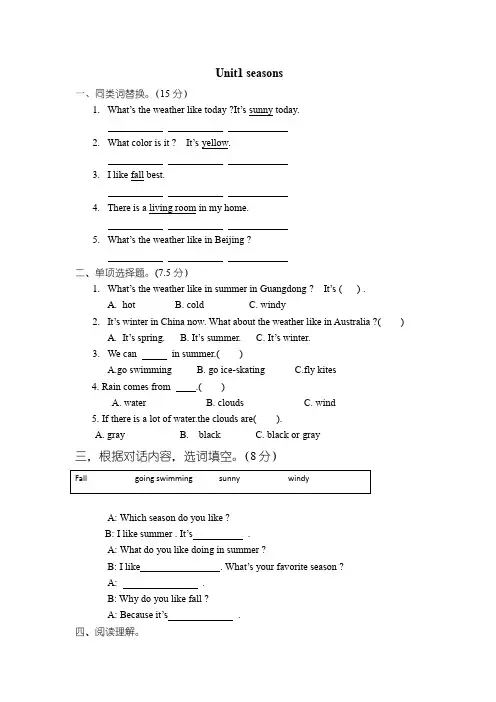
Unit1 seasons一、同类词替换。
(15分)1.What’s the weather like today ?It’s sunny today.2.What color is it ? It’s yellow.3.I like fall best.4.There is a living room in my home.5.What’s the weather like in Beijing ?二、单项选择题。
(7.5分)1.What’s the weather like in summer in Guangdong ? It’s ( ) .A.hotB. coldC. windy2.It’s winter in China now. What about the weather like in Australia ?( )A.It’s spring.B. It’s summer.C. It’s winter.3.We can in summer.( )A.go swimmingB. go ice-skatingC.fly kites4. Rain comes from .( )A. waterB. cloudsC. wind5. If there is a lot of water.the clouds are( ).A. grayB. blackC. black or gray三,根据对话内容,选词填空。
(8分)A: Which season do you like ?B: I like summer . It’s .A: What do you like doing in summer ?B: I like . What’s your favorite season ?A: .B: Why do you like fall ?A: Because it’s .四、阅读理解。
(一)It is Sunday today.The weather is fine.Bob and Jane are in the park.It is a big park.They can see many people there.They come here to have a rest after a week’s hard work and study.Some boys are playing chess on the grass.Some girls are singing and dancing. An old woman is reading a newspaper under a tall tree.A young man and his little son are playing with a toy car.How happy they are!判断正误,正确的在括号内写“T”,错误的写“F”.(10分)( ) 1.The weather is very good on Sunday.( ) 2.Bob and Jane go to the park to work and study..()3.A young woman and her little son are playing with a toy car.( ) 4.A lot of people are playing football on the grass.( ) 5.All the people in the park look very happy.Unit2一、根据字母/中文提示完成单词1.根据中文写单词。
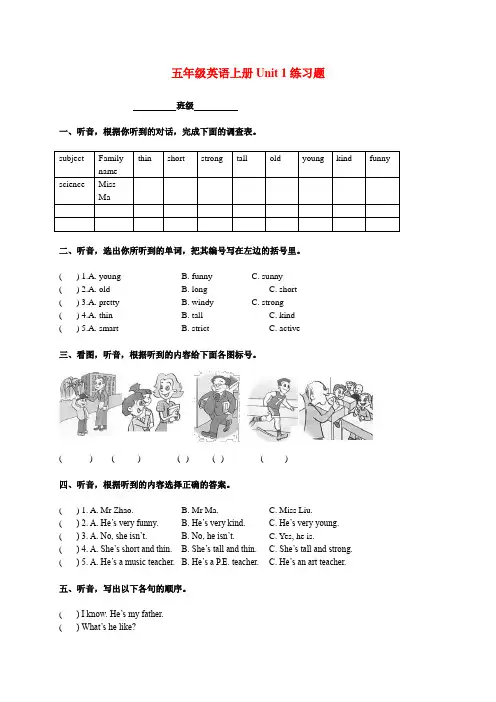
五年级英语上册Unit 1练习题班级一、听音,根据你听到的对话,完成下面的调查表。
thin short strong tall old young kind funny subject Familynamescience MissMa二、听音,选出你所听到的单词,把其编号写在左边的括号里。
( ) 1.A. young B. funny C. sunny( ) 2.A. old B. long C. short( ) 3.A. pretty B. windy C. strong( ) 4.A. thin B. tall C. kind( ) 5.A. smart B. strict C. active三、看图,听音,根据听到的内容给下面各图标号。
( ) ( ) ( ) ( ) ( )四、听音,根据听到的内容选择正确的答案。
( ) 1. A. Mr Zhao. B. Mr Ma . C. Miss Liu.( ) 2. A. He’s very funny. B. He’s very kind. C. He’s very young.( ) 3. A. No, she isn’t. B. No, he isn’t. C. Yes, he is.( ) 4. A. She’s short and thin. B. She’s tall and thin. C. She’s tall and strong.( ) 5. A. He’s a music teacher. B. He’s a P.E. teacher. C. He’s an art teacher.五、听音,写出以下各句的顺序。
( ) I know. He’s my father.( ) What’s he like?( ) Mr Carter. He’s from Canada.( ) He’s tall and strong. He’s very funny.( ) Who’s your English teacher?六、判断下面各组单词划线局部的读音,相同的打“√〞,不相同的打“×〞。
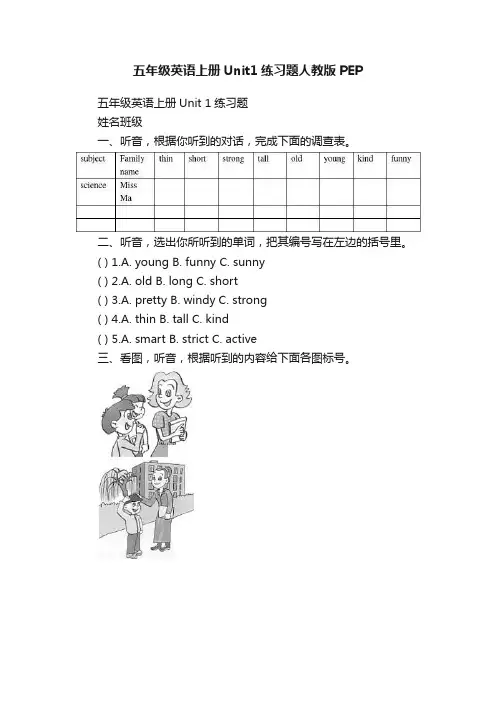
五年级英语上册Unit1练习题人教版PEP五年级英语上册Unit 1练习题姓名班级一、听音,根据你听到的对话,完成下面的调查表。
二、听音,选出你所听到的单词,把其编号写在左边的括号里。
( ) 1.A. young B. funny C. sunny( ) 2.A. old B. long C. short( ) 3.A. pretty B. windy C. strong( ) 4.A. thin B. tall C. kind( ) 5.A. smart B. strict C. active三、看图,听音,根据听到的内容给下面各图标号。
( ) ( ) ( ) ( ) ( )四、听音,根据听到的内容选择正确的答案。
( ) 1. A. Mr Zhao. B. Mr Ma . C. Miss Liu.( ) 2. A. He’s very funny. B. He’s very kind. C. He’s very young. ( ) 3. A. No, she isn’t. B. No, he isn’t. C. Yes, he is.( ) 4. A. She’s short and thin. B. She’s tall and thin. C. She’s tall and strong. ( ) 5. A. He’s a music teacher. B. He’s a P.E. teacher. C. He’s an art teacher.五、听音,写出下列各句的顺序。
( ) I kno w. He’s my father.( ) What’s he like?( ) Mr Carter. He’s from Canada.( ) He’s tall and strong. He’s very funny.( ) Who’s your English teacher?六、判断下面各组单词划线部分的读音,相同的打“√”,不相同的打“×”。
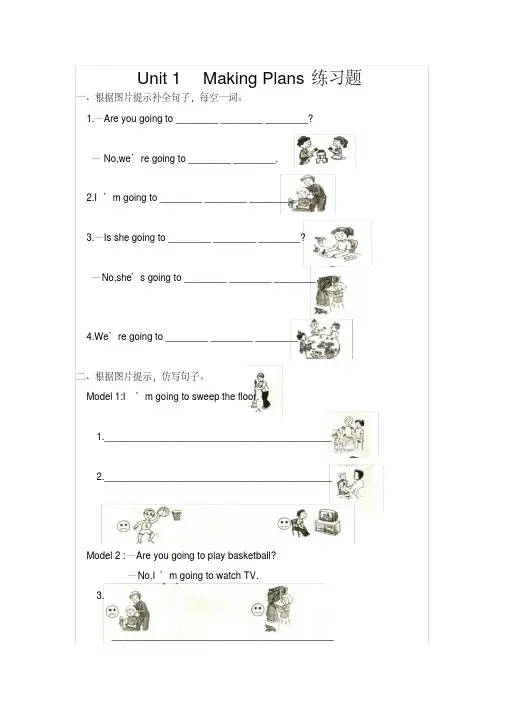
Unit 1 Making Plans练习题一、根据图片提示补全句子,每空一词。
1.—Are you going to ________ ________ ________?—No,we’re going to ________ ________.2.I’m going to ________ ________ ________.3.—Is she going to ________ ________ ________?—No,she’s going to ________ ________ ________.4.We’re going to ________ ________ ________.二、根据图片提示,仿写句子。
Model 1:I’m going to sweep the floor.1.___________________________________________2.___________________________________________Model 2 :—Are you going to play basketball?—No,I’m going to watch TV.3.____________________________________________________________________________________4.____________________________________________________________________________________三、用所给单词的适当形式填空。
1.__________(be) you going to __________(play) play basketball?2.I’m __________(write) a letter.3.Tony is going to __________(get) a haircut today.4.Jenny __________(take) a test yesterday.5.My mother is going to __________(shop) for clothes.6.__________(be) Peter going to __________(see) the doctor?四、单项填空。
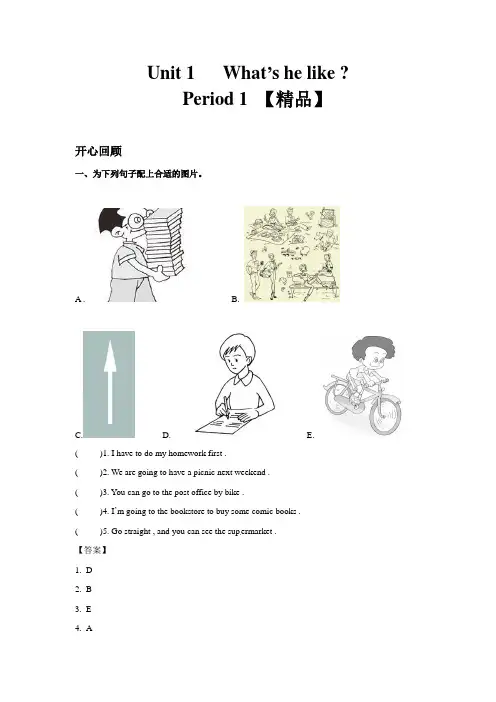
Unit 1 What’s he like ?Period 1 【精品】开心回顾一、为下列句子配上合适的图片。
A . B.C. D. E.( )1. I have to do my homework first .( )2. We are going to have a picnic next weekend .( )3. You can go to the post office by bike .( )4. I’m going to the bookstore to buy some comic books .( )5. Go straight , and you can see the sup ermarket .【答案】1. D2. B3. E4. A5. C【解析】1.句意:我必须首先写作业。
在图片D中小男孩儿正在写作业,符合题意,因此选D .2.句意:我们打算下周末去野餐。
在图片B中好多人在野餐,符合题意,因此选B .3.句意:你可以骑自行车去邮局。
在图片E中小男孩儿正在骑自行车,符合题意,因此选E .4.句意:我要去书店买一些漫画书。
在图片A中小男孩儿拿着一摞书,符合题意,因此选A .5.句意:一直走,你就可以看到超市了。
在图片C中是直行的标志,符合题意,因此选C .二、根据汉语写出相应的英语单词。
1.地铁_______2.字典________3. 担心______4. 火车_______5. 书店_______【答案】1.subway2.dictionary3.worry4.train5.bookstore【解析】1.地铁即“subway”2.字典即“dictionary”3.担心即“worry”4.火车即“train”5.书店即“bookstore”课前导学一、教学版块Let’s try and Let’s talk二、词汇全解1.know 知道,了解【过去式】knew【形近词】snow 雪【同音词】no 不【联想】remember 记住【巧记】k+now(现在)=know(知道,了解)【例句】I know who he is .我知道他是谁。
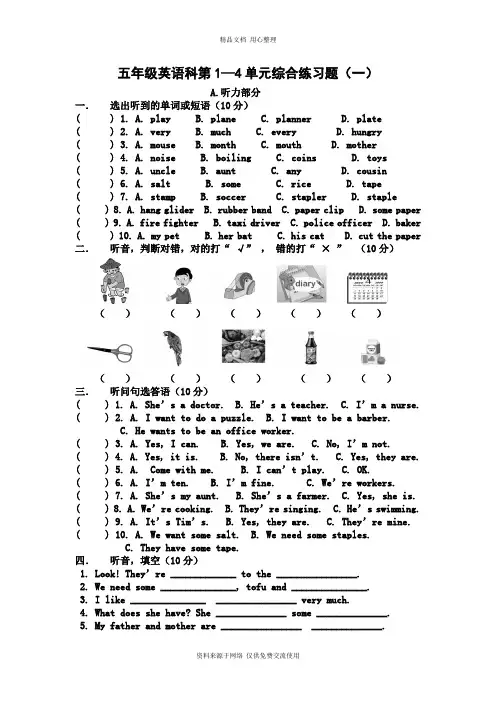
精品文档 用心整理 资料来源于网络 仅供免费交流使用 五年级英语科第1—4单元综合练习题(一) A.听力部分 一. 选出听到的单词或短语(10分) ( ) 1. A. play B. plane C. planner D. plate ( ) 2. A. very B. much C. every D. hungry ( ) 3. A. mouse B. month C. mouth D. mother ( ) 4. A. noise B. boiling C. coins D. toys ( ) 5. A. uncle B. aunt C. any D. cousin ( ) 6. A. salt B. some C. rice D. tape ( ) 7. A. stamp B. soccer C. stapler D. staple ( ) 8. A. hang glider B. rubber band C. paper clip D. some paper ( ) 9. A. fire fighter B. taxi driver C. police officer D. baker ( ) 10. A. my pet B. her bat C. his cat D. cut the paper 二. 听音,判断对错,对的打“ √” , 错的打“ × ” (10分)
( ) ( ) ( ) ( ) ( ) ( ) ( ) ( ) ( ) ( ) 三. 听问句选答语(10分) ( ) 1. A. She’s a doctor. B. He’s a teacher. C. I’m a nurse. ( ) 2. A. I want to do a puzzle. B. I want to be a barber. C. He wants to be an office worker. ( ) 3. A. Yes, I can. B. Yes, we are. C. No, I’m not. ( ) 4. A. Yes, it is. B. No, there isn’t. C. Yes, they are. ( ) 5. A. Come with me. B. I can’t play. C. OK. ( ) 6. A. I’m ten. B. I’m fine. C. We’re workers. ( ) 7. A. She’s my aunt. B. She’s a farmer. C. Yes, she is. ( ) 8. A. We’re cooking. B. They’re singing. C. He’s swimming. ( ) 9. A. It’s Tim’s. B. Yes, they are. C. They’re mine. ( ) 10. A. We want some salt. B. We need some staples. C. They have some tape. 四. 听音,填空(10分) 1. Look! They’re _____________ to the ________________. 2. We need some _______________, tofu and _______________. 3. I like _______________ ________________ very much. 4. What does she have? She ______________ some ______________. 5. My father and mother are ________________ ______________. 精品文档 用心整理 资料来源于网络 仅供免费交流使用 B.笔试部分 一. 辨音,选出发音不同的词(5分) ( ) 1. A. son B. duck C. put ( ) 2. A. parrot B. paper C. rabbit ( ) 3. A. sugar B. some C. sure ( ) 4. A. nose B. boys C. noise ( ) 5. A. pet B. bat C. any 二. 根据字母提示填空(8分) 1. My c_____________ is my uncle’s son. 2. The shopping mall is n______________ to Tony’s house. 3. The f______________ work on the farm. 4. Look! A s_____________ is on the envelope. 5. I want the s_______________ to cut the paper. 6. Are they m______________ something? Yes, they are. 7. I have two d__________. I often use them to look up the words(单词). 8. Jenny v_____________ us every Sunday.
五年级上册unit1~unit5综合练习
一,中英互译。(20分)
春天____________ 晴朗的__________ 冬天 ___________ 下雪的_________ 铅笔盒_______________
八月___________ 在…之前___________ 十一月___________ 一月____________ 地图____________
juice___________ fall_____________ October___________ windy____________ February___________
crayons____________ rice _____________ sugar____________ color__________ need___________
二,翻译下列词组。(10 分)
三杯果汁_______________ 五个书包________________ 两块黑板_____________ 天气预报______________
五片树叶_______________ 七月28日______________ 六月3日_____________ 一些纸_________________
一些糖__________________ 三张圆桌________________
三,单选。(20分)
1. What _____the weather ______today? It’s Sunday.
A. is , likes B. is , like C. are , like
2. What’s the weather like in summer in Guangzhou? _________.
A. It’s hot. B. It’s cold. C. It’s cool.
3. When’s your mother’s birthday? It’s ____ April.
A. on B. at C. in
4.when’s the children’s day? _________.
A. It’s august 1st. B. It’s June 3rd. C. It’s June 1st.
5.when’s the party? _________. It’s __________.
A. in may. B. Sunday. C. at 7:00.
6. What day is it today?_________.
A. It’s April 3rd. B. It’s Sunday. C. It’s on Monday.
7.what’s the date today? __________.
A. It’s April 3rd. B. It’s Sunday. C. It’s on Monday.
8. Do you have ________? Yes, I do.
A. any papers B. some paper C. any paper
9. ___________? No, she doesn’t.
A. Does she have any glue? B. Do she have any glue?
C. Does she has any glue?
10. What do you need? __________.
A. I need some papers B. She need some tofu. C. I need some tofu.
11. __________? He needs some salt.
A. Do you need any salt? B. Does he need any salt? C. What does he need?
12. ____ she ______ any sugar? Yes, she does.
A. Does, have B. Does, has C. Do, have
13. ____________? I have some sugar.
A. What do you have? B. Do you have any sugar? C. What do you need?
14. Can I have _______ rice? Yes, you can.
A. any B. some C. a
15. What ________ Jenny and Tony have? They have some maps.
A. Does B. Do C. is
16. ____________? Yes, it is.
A. Is March before May? B. Is June after July? C. Is September before August?
17. _______________? It’s in July.
A. When’s winter holiday? B. When’s summer holiday? C. When’s the fathers’ day?
18. __________? It’s windy and cool.
A. What’s the weather like in spring? B. What’s the weather like in summer?
C. What’s the weather like in fall?
19.when’s your birthday? _______.
A. It’s April 3rd. B. It’s Sunday. C. It’s in fall.
20. ______________? No, he doesn’t. But he has some pencils.
A. Does he have any pens? B. Does he need any pencils? C. What does he have?
四,用所给单词的适当形式填空。(20分,每空一分)
1. What’s the weather like in spring? It’s __________(rain).
2. _______(be)it _________(wind) in fall? Yes, it ___________(be).
3. _________(do) she _________(have) any__________(glue)? Yes, she _________(do).
4. _________(do) they _______(have) any __________(paper)? No, they ____________ (do not).
5. She ________(have) some ___________(crayon) and ______________(picture).
6. My mother __________ (need) some ____________ (fruit).
7. Jenny and Tony __________ (need) some _______________ (tofu).
8. ___________ (do) your mother _________ (have) any ____________ (rice)? No , she _____________ (do not).
五,根据所给的中文意思把下列句子补充完整。(30分,每空一分)
1. 杭州的春天是多雨的和温暖的。
The _____________ is __________ and _____________ in _______________ in Hangzhou.
2. 我喜欢秋天,因为很凉爽。
I ________ __________ because it’s ____________.
3. 寒假是在什么时候?
__________ is __________ holiday?
4. 托尼的爸爸有钢笔吗? 是的,他有。
__________ Tony’s father have ___________pens? Yes, he ____________.
5. 她需要一些肉吗?不,她不需要。
__________ she __________ any ____________? No, she ___________.
6. 我能要一些蔬菜吗? 当然。
Can I have ___________ ______________? Sure.
7.你的弟弟有什么?他有一些蜡笔。
What ________ your brother ______________? He ________ some _______________.
8. 你的奶奶是什么时候生日?她的生日是在12月21日。
_________ is your grandmother’s ___________? It’s __________________.
9.我的妈妈正在煮饭。 她需要一些盐和米。
My mother __________ ______________. She __________ some __________ and __________ .